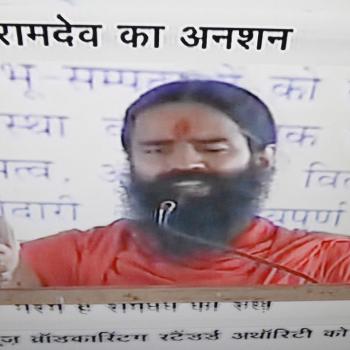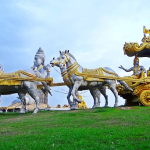This is the second part of an interview I did with Christopher Fici — a former ISKCON monk finishing his doctorate at Union Theological Seminary and board member at Sadhana: Coalition of Progressive Hindus. Read part one here. Here, Chris talks about the connections between the Gaudiya Vaishnav tradition and ecology, ecological initiatives at the Bhakti Center in New York City, and more.
Did you always have a strong connection with nature, growing up in Detroit?
The best thing about living in Michigan is the Great Lakes. Every summer my family and I — we’re starting to do this again in the past couple of years — we would go to one of our friend’s cottages on the tip of the thumb in Michigan. Being back there last year reminded me of how important those lake are. They speak to you on a spiritual level. It may take you a few decades to understand what you’re hearing on a spiritual level.
Although I grew up in this nondescript suburb of Detroit, we had a freeway running through the middle of our town and that’s pretty much it. It was a nice suburban life but when you go to the lakes that’s when you really step into an experience of nature that’s really unique. There’s nothing like those lakes in the world. I would love to retire to a hermitage up there at some point.
Understanding the theology behind worshipping Ganga and Yamuna, it resonates so much with me when I come back and see these lakes. I would say these are still places of recreation for me and my family, but I see them in a much more sacred sense now. Even just taking a swim out there, I’m swimming in a much more spiritual consciousness than I did before. That comes directly from these different Hindu traditions of seeing sacred water worship.
What’s unique in the Hindu perspective on ecology and the environment?
What’s unique, both in studying scriptures and the personal experience as a Hindu relating to ecology, is this sense of understanding about how interconnected we all are.
You can understand the theory of karma by trying to understanding looking at the flowers, looking at the birds, and at some point in your journey through reality, you have been these creatures. That should manifest within yourself a sense of understanding, respect, and honoring other living beings.
In a couple verse of the Bhagavad Gita, Krishna says a wise sage sees every living being on the spiritual platform of equality; someone who’s a brahmin, a dog, an elephant, and a dog-eater (an outcast). One element of that teaching is to say within each living being is the soul, is the atman. That’s very different than some elements of traditional Christian theology.
There’s a famous video of Prabhupada having a conversation, an argument, with a famous French Cardinal from the 1960-70s, about whether the soul existed in animal bodies. This Cardinal, who was a very progressive Christian thinker, just couldn’t grasp that a dog or a chicken had a soul like a human being. Prabhupada was very firm on that point [that they do].
This sense, from the Bhagavad Gita where Krishna says I am the taste of water, of animals I am the lion, I’m the shark, he’s the thread of all existing reality. Of all these different manifestations of material reality, of spiritual reality, he is the connecting thread.
Something that I discovered at the Hinduism and Ecology conference at the Govardhan Eco Village in December, talking to David Haberman and reading his book, River of Love in an Age of Pollution, was a beautiful tradition of worshipping the sacred river of the Ganga. At the Eco Village every evening there’s a beautiful Yamuna Arati. There’s a rhythm of the community where it’s designed in such a way to stop what you’re doing and come to this arati and worship this version of the Yamuna River. Reading his book, there’s this beautiful bhakti theology of how Yamuna is a Goddess. She is the liberator of all of her dearest disciples. She protects and benefits everyone who offers her bhakti.
It’s very Jesus-like references sometimes. There’s a lot of resonances with that too with what I’ve seen in Native American traditions, this sense that this tree is not just some collection of chemicals and biology, it’s a living being.
Of course, David’s book goes into very great detail about how Ganga and Yamuna are almost polluted to death at this point. It asks a lot of challenging questions about how you look at certain elements of advaita Vedanta where it’s very world denying. It’s very much about getting out of here and merging with Brahman, basically devaluing the world — how that also hooks up with devaluing the feminine too. But at the same time the reason these rivers are so polluted is because, after independence you have Nehru coming in and saying things like “the dams are our temples now”. The sort of thing Gandhi was completely against. For Gandhi, independence was not becoming the turbo capitalist West.
Particularly through the Gandhian lens, this idea of ecological community, anticipatory community, was something that very much inspired Swami Prabhupada for his ISKCON community, creating these farm communities. He could understand, both by just viewing the world but also on a deeper level of what it means to be attached/detached and live a proper life, this very consumerist lifestyle is not sustainable, not healthy, or sane.
So, what’s the alternative? I’m inspired to say we desperately need an alternative. Gandhi often called it plain living, high thinking. Prabhupada used simple living, high thinking. This sense of living a dharmic life: simplicity, devotion, living as the Eco Village describes it as a symbiotic consciousness, live within your ecosystem, knowing you’re a human being, knowing you’re going to make an impact, but try to minimize the destructive impacts as much as possible. Be a good neighbor to your ecosystem. Live in harmony and that rhythm. That very much jives with a lot of teachings about what it means to be properly devoted.
There’s a teaching in the Isha Upanishad, one of the primary Upanishadic texts that Vaishnavs study, in the first verse it says ‘Everything belongs to God.’ That can change your consciousness, because we’re so conditioned and attached to living in this world saying ‘this belongs to me’. It helps you raise your consciousness to a level that says no all of this is of God and belongs to God.
Then the second part of the teaching is that God then gives you everything you need to live. Prabhupada uses the term quota—he has some anachronistic ways of describing things in English. In the same quote it says Krishna gives you everything you need to flourish.
And you should understand what that means in terms of looking at the components of your daily life. Looking at this with an ecological lens, saying this helps me to flourish spiritually and to also be a good citizen of the planet, this doesn’t and therefore this is something that’s not necessary. Trying to develop a consciousness of simplicity. Both Prabhupada and Gandhi, it’s part of what it means to live dharmically, by living in harmony and simplicity then all kinds of horizons for expanding your consciousness open in your daily life.
How does Gaudiya Vaishnav theology support a more ecologically aware worldview?
To be a devotee, it means Krishna is at the center of everything you try to do, the center of every conscious thought. To be a devotee of Krishna means you’re trying to stop being so attached to this ahamkara, your false ego, these compulsions in yourself that make you greedy, that make you hateful, that make you want take undue ownership over things. Within Vaishnav teachings it’s this sense that if we are so attached to our ahamkara, we’re naturally going to be destructive. That manifests both in our own consciousness, but also in the way we interact with each other and with the environment.
When you look at the kind of environmental movement there are a lot of very scientific explanations of why what’s happening is what’s happening, there’s a lot of cultural and sociological components of that. I think what religious folks can provide is a sense of what it actually means to desire, what it means to consider what success is, what is progress.
What Prabhupada was saying is go start farm communities even before there was an Earth Day. It was very close together. Part of his mission in coming here and spreading Vaishnav culture, he didn’t just tack on the environmental part because he saw that was becoming a thing in the late 60s and early 70s. It’s already part of our tradition. You can practice bhakti anywhere. But he would very much encourage anyone who wanted to to go start a farm community. He would say if you have a simple life revolved around Krishna and you try to live simply, eat simply, live in a sustainable ecological way, that is most conducive to practicing devotional consciousness, practicing bhakti.
What are the environmental initiatives now being undertaken at the Bhakti Center?
Radhanathswami asked us last year to start an ecology initiative at the Bhakti Center, wanting to bring some of that consciousness of the Eco Village there. People’s ecological consciousness is deepening. People are really beginning to acknowledge what’s happening in a way that didn’t really exist even ten years ago. We have a pretty hip community at the Bhakti Center. We want people who come to the Bhakti Center to see that we’re making at attempt to be a green temple.
When you come to the Bhakti Center now you see clearly labeled recycling, composting. People are happy to participate — although it is always a challenge to try to get people to buy in at first, trying to get people to understand the importance of it, how it fits into being devotional. We’re also trying to be more conscious about where we get our produce. We have an idea of eventually getting some sort of LEED type of certification for the temple too, so, when you walk in, you see the certification. That makes a big impact.
What we’ve also developed is a Sacred Ecology Forum. We’re doing eco-sanghas once a month. We talk about different elements of the bhakti tradition. This Sunday we’re going to do food. What it means to have a sacred food ethic. We offer food to deity of Krishna, it comes back as prasadam and actually the eating of the prasadam is itself is its own kind of yoga practice or devotional act. But then when you also bring in perspectives from the environmental world, what does it mean to have a food ethic? What the whole point of the eco-sanghas is to say we practice bhakti, but ask what does it mean to practice eco-bhakti?
Then we’re also developing retreats, at Supersoul Farm with our friend Raghunath Cappo as his farm in upstate New York. We’re trying to develop some sacred ecology retreats there. Also Gopal Patel, from the Bhumi Project, and Vineet Chander, the Hindu Life Director at Princeton University, are developing a green Gita workshop, how do you look at the Bhagavad Gita through an ecological lens.
The idea is all of these different components of the Bhakti Center programing is to have a sacred ecology component so that people come, whether they are practicing devotees or new to the tradition, and it’s a community for them to practice their bhakti and encourage the ecology side of it.
To be a devotee means you have to be ecologically conscious, too.

















